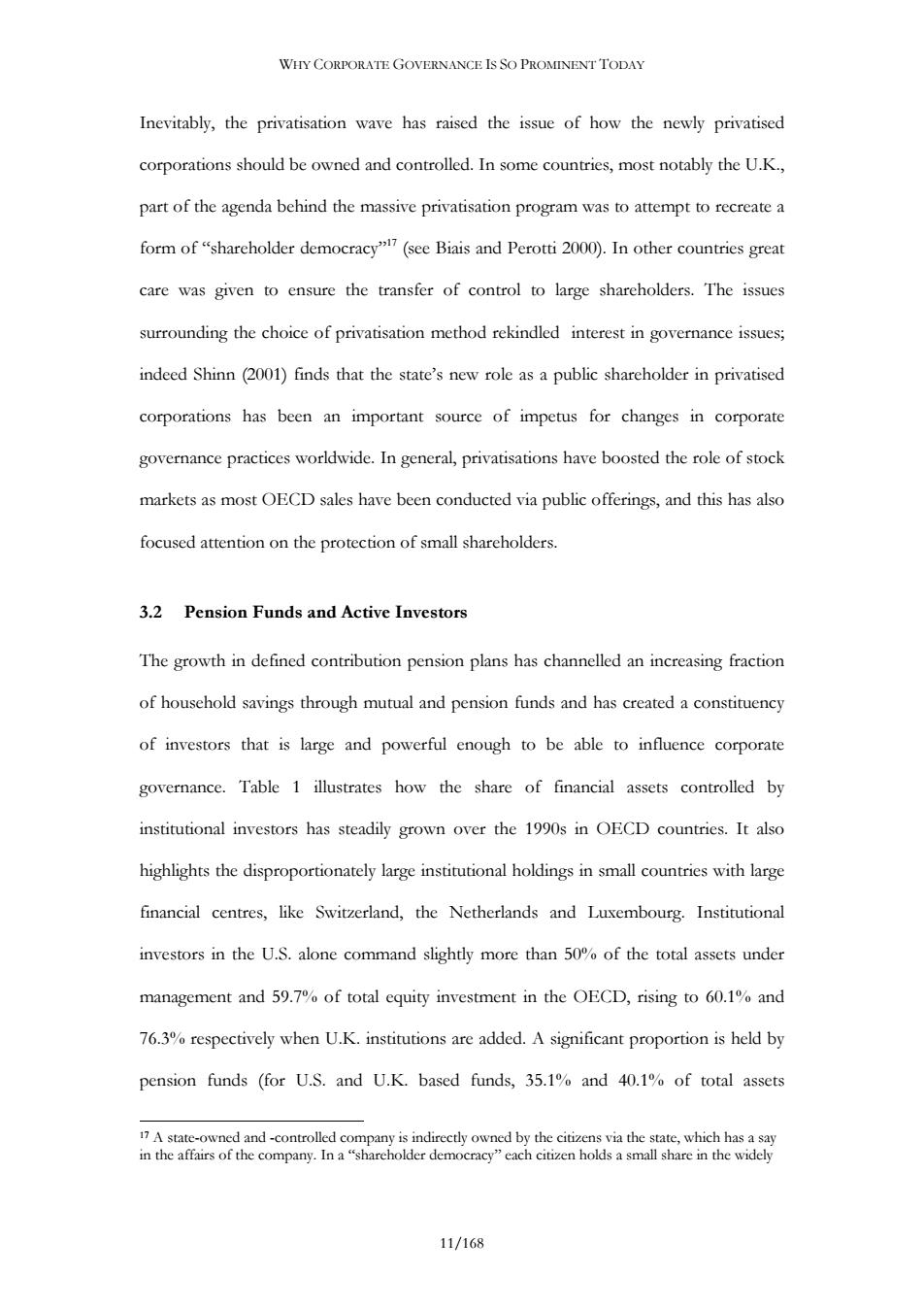正在加载图片...

WHY CORPORATE GOVERNANCE IS SO PROMINENT TODAY Inevitably,the privatisation wave has raised the issue of how the newly privatised corporations should be owned and controlled.In some countries,most notably the U.K., part of the agenda behind the massive privatisation program was to attempt to recreate a form of"shareholder democracy7(see Biais and Perotti 2000).In other countries great care was given to ensure the transfer of control to large shareholders.The issues surrounding the choice of privatisation method rekindled interest in governance issues; indeed Shinn (2001)finds that the state's new role as a public shareholder in privatised corporations has been an important source of impetus for changes in corporate governance practices worldwide.In general,privatisations have boosted the role of stock markets as most OECD sales have been conducted via public offerings,and this has also focused attention on the protection of small shareholders. 3.2 Pension Funds and Active Investors The growth in defined contribution pension plans has channelled an increasing fraction of household savings through mutual and pension funds and has created a constituency of investors that is large and powerful enough to be able to influence corporate governance.Table 1 illustrates how the share of financial assets controlled by institutional investors has steadily grown over the 1990s in OECD countries.It also highlights the disproportionately large institutional holdings in small countries with large financial centres,like Switzerland,the Netherlands and Luxembourg.Institutional investors in the U.S.alone command slightly more than 50%of the total assets under management and 59.7%of total equity investment in the OECD,rising to 60.1%and 76.3%respectively when U.K.institutions are added.A significant proportion is held by pension funds (for U.S.and U.K.based funds,35.1%and 40.1%of total assets 17A state-owned and-controlled company is indirectly owned by the citizens via the state,which has a say in the affairs of the company.In a"shareholder democracy"each citizen holds a small share in the widely 11/168WHY CORPORATE GOVERNANCE IS SO PROMINENT TODAY Inevitably, the privatisation wave has raised the issue of how the newly privatised corporations should be owned and controlled. In some countries, most notably the U.K., part of the agenda behind the massive privatisation program was to attempt to recreate a form of “shareholder democracy”17 (see Biais and Perotti 2000). In other countries great care was given to ensure the transfer of control to large shareholders. The issues surrounding the choice of privatisation method rekindled interest in governance issues; indeed Shinn (2001) finds that the state’s new role as a public shareholder in privatised corporations has been an important source of impetus for changes in corporate governance practices worldwide. In general, privatisations have boosted the role of stock markets as most OECD sales have been conducted via public offerings, and this has also focused attention on the protection of small shareholders. 3.2 Pension Funds and Active Investors The growth in defined contribution pension plans has channelled an increasing fraction of household savings through mutual and pension funds and has created a constituency of investors that is large and powerful enough to be able to influence corporate governance. Table 1 illustrates how the share of financial assets controlled by institutional investors has steadily grown over the 1990s in OECD countries. It also highlights the disproportionately large institutional holdings in small countries with large financial centres, like Switzerland, the Netherlands and Luxembourg. Institutional investors in the U.S. alone command slightly more than 50% of the total assets under management and 59.7% of total equity investment in the OECD, rising to 60.1% and 76.3% respectively when U.K. institutions are added. A significant proportion is held by pension funds (for U.S. and U.K. based funds, 35.1% and 40.1% of total assets 17 A state-owned and -controlled company is indirectly owned by the citizens via the state, which has a say in the affairs of the company. In a “shareholder democracy” each citizen holds a small share in the widely 11/168